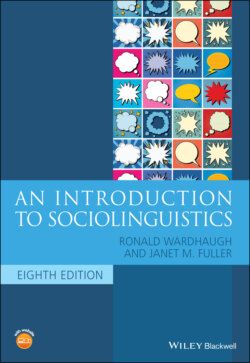Читать книгу An Introduction to Sociolinguistics - Ronald Wardhaugh, Janet M. Fuller - Страница 12
Оглавление
Acknowledgments
I did the bulk of this eighth edition in the first half of 2020, during the beginning of the Covid‐19 crisis, which included sheltering with six other family members (three human, three canine) in my house, which was a bit too small for the seven of us. Embedded in the craziness of these times was also the stimulating environment of living with my three mentors for understanding contemporary culture. Our conversations often revolved around many of the issues of social inequality and power abuse which were put into sharp focus in these months. I am sure that many of my readers spent many hours, as we did, reading and discussing the many horrible developments of this time, and taking the edge off the despair by laughing at memes. The intensity of this situation is seen overtly in only a few moments of this book, but it arguably has permeated all of my writing. For this I owe a great debt of thanks to Indigo Nathani, Jayden Nathani and Niko Johnson‐Fuller. In addition to providing me with new perspectives and ideas, they also read sections of the book and offered invaluable feedback. Niko has long acted as my youth culture/technology support staff and continued in that role for this book. (If what I’ve included is nonetheless cringey, he’s not to blame.)
My co‐workers Zorro Montenegro de Alemania, Guadalupe Runter vom Sofa, and Biene Fetzt also deserve a mention. Although their demands for walks sometimes seemed a burden, ultimately they helped us to stay sane.
Although this book was finished in the age of the corona, I started it much earlier. I signed a contract shortly before moving to Groningen in 2017, and while taking on this new position delayed work on the book, it also provided me with a fabulous context within which to grow as a sociolinguist. I know ‘fabulous’ is a strange word to use for the workplace, but there really is not a more appropriate word for my colleagues here. Especially the members of the Language & Society team, but all of the members of the European Languages and Cultures program, as well as many valuable colleagues in the Center for Language and Cognition in Groningen, have made my job a pleasure and provided me with a rich intellectual environment.
The field of sociolinguistics is increasingly concerned with issues of power and inequality, and as these issues become central, more and more sociolinguists are reflective about the history of the field and how we have brought our own biases to the study of language in society. I am proud to be part of a field that is addressing important social issues and doing the difficult work of reflexivity, while I am also aware that there is much room for improvement, in the field and in this book. Many of the chapter reviewers were helpful in pointing out my own anglophone, binary, and Western biases; while I fear these biases are still present in this book, the extent to which I have succeeded in being more inclusive is due to the excellent feedback I got from reviewers. In addition, they provided input on the content to make this up‐to‐date and accurate. (Any errors are, of course, my own.) For reviews of book chapters I would like to thank Charlotte Gooskens, Marina Terkouafi, Tony Webster, Itxaso Rodriguez‐Ordonez, Farzad Karimzad, Aurelie Joubert, Eva Daussa, Emily Davis, Lotte Verheijen, Joana Duarte, and Nanna Hilton. I literally could not have finished the book without their help. I would also like to thank Stefan Dollinger for helpful comments on various chapters which helped improve the content and text.
A special thanks goes to Itxaso Rodriguez‐Ordonez, who, in addition to offering feedback on two chapters of the book, also discussed the book proposal for this eighth edition with me prior to its submission, providing many ideas about topics to include and how to re‐package some of the information already included. Her input on this was invaluable.
I would also like to thank Roberto Barrios and Kelly McGuire for their insider expertise and advice in the making of Exploration 1.3.
I also owe a continued thanks to the first author, Ronald Wardhaugh, and the editors and staff at Wiley Blackwell, who have made this book possible.
